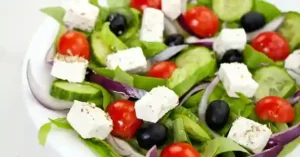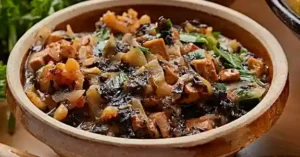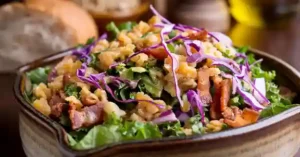Chicken salan is a classic curry enjoyed across South Asia. It combines tender chicken with a rich, spiced gravy that is both comforting and flavorful. The dish is simple to prepare yet full of depth, making it a favorite for family meals and gatherings. This recipe will guide you step by step so you can create authentic chicken salan at home.

Introduction to Chicken Salan Recipe
Chicken salan is a traditional South Asian curry prepared with chicken pieces simmered in a spiced gravy. The word salan refers to curry or sauce, which is usually rich, aromatic, and served with bread or rice. This dish holds a central place in Pakistani and Indian households, often cooked for everyday meals as well as special occasions.
What makes chicken salan unique is its balance of spices. Instead of being overly fiery, it offers a blend of warmth and fragrance through ingredients like onions, tomatoes, ginger, garlic, and ground spices. The chicken absorbs these flavors as it cooks, creating a savory and hearty meal.
Beyond its taste, chicken salan is valued for its versatility. It can be made light with a thin gravy for pairing with rice or thicker for eating with naan or chapati. Regional variations also exist, with some families adding yogurt, potatoes, or fresh herbs to suit their preferences.

Essential Ingredients
To prepare authentic chicken salan, the right ingredients are key. Each component plays a specific role in building flavor, aroma, and texture. Below is a breakdown of the essentials:
Chicken
Use bone-in chicken pieces for deeper flavor in the curry. Boneless chicken can also be used, but bones enrich the gravy.
Onions
Finely sliced onions form the base of the masala. They add sweetness, body, and a golden color once browned.
Tomatoes
Fresh tomatoes or pureed tomatoes give tanginess and help thicken the gravy.
Ginger and Garlic
A paste of ginger and garlic adds freshness, sharpness, and depth to the curry.
Whole Spices
Bay leaves, cinnamon, cloves, and cardamom are often used at the start to release aroma into the oil.
Ground Spices
Red chili powder, turmeric, coriander powder, and cumin provide the characteristic flavor and color of chicken salan.
Yogurt (Optional)
Yogurt can be added for a creamier texture and mild tang that balances strong spices.
Cooking Oil or Ghee
Oil or ghee acts as the cooking medium and helps carry the flavors of the spices.
Fresh Herbs
Coriander leaves and green chilies are typically added at the end for freshness and garnish.
Salt and Water
Salt enhances overall flavor, while water controls the consistency of the curry.

Preparing the Base Masala
The base masala is the foundation of chicken salan. It creates the depth of flavor that carries through the entire dish. Preparing it properly is essential for an authentic taste.
Heat the Oil or Ghee
Begin by heating oil or ghee in a deep pan or pot. A wide surface helps onions cook evenly.
Add Whole Spices
Drop in bay leaves, cinnamon, cloves, and cardamom. Let them sizzle for a few seconds until fragrant. This step infuses the oil with aroma.
Cook the Onions
Add finely sliced onions. Stir frequently and cook until they turn golden brown. This caramelization adds sweetness and body to the gravy.
Add Ginger-Garlic Paste
Stir in the paste and sauté for a minute. It should release a fresh aroma without burning.
Incorporate Tomatoes
Add chopped or pureed tomatoes. Cook until the oil begins to separate from the mixture. This indicates the rawness is gone and the base is ready.
Blend in Ground Spices
Mix in red chili powder, turmeric, coriander powder, and cumin. Fry briefly to release their flavors. A small splash of water prevents burning.

Cooking the Chicken
Once the base masala is ready, the chicken is added to absorb its flavors and cook to tenderness. This stage decides the richness and balance of the curry.
Add the Chicken Pieces
Place cleaned chicken pieces into the prepared masala. Stir well so each piece is coated with the onion-tomato and spice mixture.
Sear the Chicken
Cook on medium-high heat for 5–7 minutes. This seals in the juices and allows the chicken to pick up the flavors of the spices.
Control the Heat
Stir occasionally to prevent sticking. Adjust the flame so the chicken cooks evenly without drying out.
Add Water for Gravy
Once the chicken is lightly browned, pour in enough water to create the desired curry consistency. For a thinner salan, add more water; for a thicker one, add less.
Simmer Until Tender
Cover the pot and let the chicken simmer on low heat for 20–25 minutes. Stir occasionally. The slow cooking ensures the meat becomes tender while the flavors deepen.
Check for Doneness
The chicken should be cooked through but not falling apart. Taste the gravy and adjust salt or spices as needed.

Adjusting Consistency and Flavor
The final taste and texture of chicken salan depend on how well you balance the gravy and spices. Small adjustments at this stage can elevate the dish.
Check Gravy Thickness
If the curry is too thin, simmer uncovered for a few minutes until it reduces and thickens. If it is too thick, add warm water gradually until you reach the desired consistency.
Balance the Spices
Taste the gravy and adjust according to preference. Add a little more red chili powder for heat, or reduce by mixing in a spoon of yogurt to mellow the spice.
Enhance Aroma
A pinch of garam masala at the end lifts the fragrance. Add it just before turning off the heat to preserve its freshness.
Adjust Salt and Acidity
Salt should be balanced—not overpowering, not bland. If the curry feels heavy, a squeeze of lemon juice or a spoon of yogurt adds brightness.
Finish with Fresh Herbs
Garnish with chopped coriander leaves and sliced green chilies. This adds color, freshness, and a final layer of flavor.

Optional Additions and Variations
Chicken salan is a versatile dish, and many households adapt it to their own taste. Small changes in ingredients can create distinct flavors and regional touches.
Potato Chicken Salan
Adding diced potatoes makes the curry heartier and stretches the dish to serve more people. Potatoes absorb the spices and blend smoothly with the gravy.
Yogurt-Based Salan
Mixing in whisked yogurt during cooking gives the curry a creamy texture and a mild tang. This variation is common in North Indian and Punjabi kitchens.
Coconut or Cream Enrichment
In some regions, coconut milk or cream is added for a rich, velvety gravy. This softens the spice and makes the dish suitable for special occasions.
Green Masala Version
A blend of fresh coriander, mint, and green chilies can be used instead of red chili powder and tomatoes. This gives a fresher, herbal taste.
Dry Chicken Salan
By reducing the water and letting the gravy thicken, you can create a semi-dry version that pairs well with parathas or naan.
Regional Flavors
- Hyderabadi Style: Often includes whole spices and fried onions for depth.
- Pakistani Style: Usually thinner gravy, ideal with rice.
- Lucknowi Style: Subtler in spice, focusing on aroma and gentle flavors.

Serving Suggestions
Chicken salan is best enjoyed when paired with the right accompaniments. The choice of side can enhance the overall meal and highlight the flavors of the curry.
With Rice
A thinner, runny salan pairs perfectly with plain steamed basmati rice. The rice absorbs the spiced gravy, creating a simple yet satisfying combination. For a richer option, serve with jeera rice or pulao.
With Roti or Chapati
Soft, homemade rotis or chapatis are ideal for scooping up the chicken and gravy. This is the most common way chicken salan is served in everyday households.
With Naan or Paratha
For a more indulgent meal, serve chicken salan with tandoori naan or flaky parathas. The thicker gravy clings well to these breads, making each bite hearty.
Side Dishes
A simple salad of onions, cucumbers, and tomatoes adds freshness. Raita (yogurt mixed with herbs or spices) cools the palate and balances the heat. Pickles and chutneys provide a sharp contrast to the rich gravy.
Occasion Serving
For festive gatherings, chicken salan can be served alongside biryani or a spread of kebabs and vegetable curries, making it part of a complete feast.

Storage and Reheating
Chicken salan can be prepared in advance and stored for later meals. With proper handling, it stays fresh and flavorful without losing quality.
Cooling Before Storage
Allow the salan to cool at room temperature before storing. Placing hot curry directly in the refrigerator can cause condensation and spoilage.
Refrigeration
Store in an airtight container. Chicken salan remains good for 2–3 days when refrigerated. Always keep it covered to prevent absorbing other food odors.
Freezing Option
For longer storage, freeze portions in sealed containers. It can last up to 2 months. When freezing, avoid adding fresh herbs until reheating, as they lose flavor.
Reheating on Stovetop
Reheat gently in a pan over medium heat. Add a splash of water if the gravy has thickened. Stir occasionally to ensure even heating.
Microwave Method
Place in a microwave-safe dish, cover, and heat in short intervals. Stir in between to avoid uneven hot spots.
Food Safety Tip
Do not reheat chicken salan more than once. Only reheat the portion you plan to eat to maintain freshness and avoid contamination.

Nutritional Insights
Chicken salan is not only flavorful but also provides balanced nutrition when prepared with moderate oil and spices. Understanding its nutritional value helps in making it part of a healthy diet.
Protein Source
Chicken is a lean protein that supports muscle growth and repair. Using skinless pieces reduces fat while keeping the dish filling and satisfying.
Healthy Fats
Cooking in moderate oil or ghee adds necessary fats for energy. Choosing healthier oils, such as sunflower or canola, lowers saturated fat content.
Spices and Herbs
Ingredients like turmeric, ginger, garlic, and coriander not only enhance flavor but also contribute antioxidants and digestive benefits.
Calorie Count
A medium serving (1 cup with gravy) provides around 250–300 calories, depending on oil quantity. Adding cream or extra ghee increases richness and calories.
Carbohydrate Balance
Chicken salan itself is low in carbs, but when served with rice, naan, or chapati, the meal becomes more energy-dense. Pairing with whole wheat roti or brown rice improves nutritional balance.
Vitamins and Minerals
Tomatoes and onions add vitamin C, potassium, and fiber, while fresh coriander provides vitamin K and freshness.
Conclusion
Chicken salan is more than just a curry; it is a comforting dish that reflects tradition, flavor, and versatility. With a few simple ingredients and careful preparation, you can create a meal that is rich, aromatic, and perfect for sharing. Whether paired with rice or bread, it is a recipe that brings families together and remains a timeless favorite in South Asian kitchens.
FAQS

Chicken Salan Recipe
Ingredients
Method
- Heat the oil in a deep pot
- Add in the diced onions. Cook these on a medium high heat till the onions become translucent and begin to brown lightly on the edges,
- Add the halved tomatoes and a splash of water. Cover and steam this on low for about 5 minutes, lid on. Once the 5 minutes are up, the skin should slip off the tomatoes easily. Remove and discard.
- Turn the heat up, add the garlic, ginger and all the spices and dry out the masala, stirring constantly. Use your spoon to mash the onions and tomatoes as you stir. Alternatively, you can blend these to get a super smooth masala fast.
- Once the masala is super dry, the oil begins to separate at the edges and the masala begins to catch at the bottom of the pot, add the chicken.
- Sauté the chicken on high heat, again stirring constantly, until the chicken changes colour and no longer remains pink.
- Add 2.5 cups of water. Bring to a boil, then cover and simmer on low for half an hour.
- Once the chicken is cooked through, stir in the garam masala and coriander/dried fenugreek.
